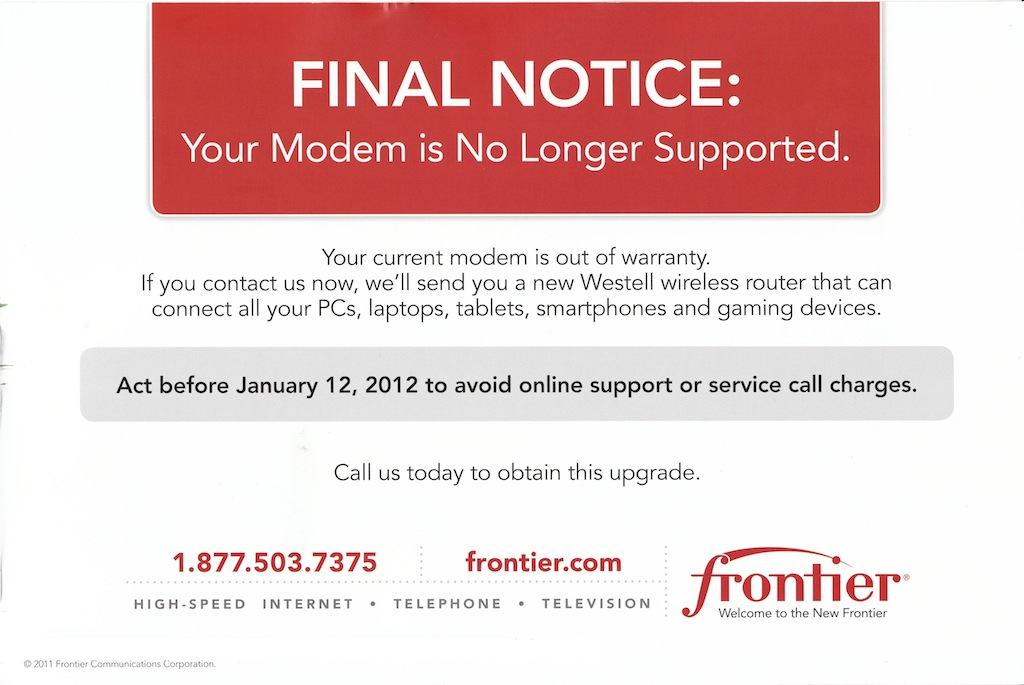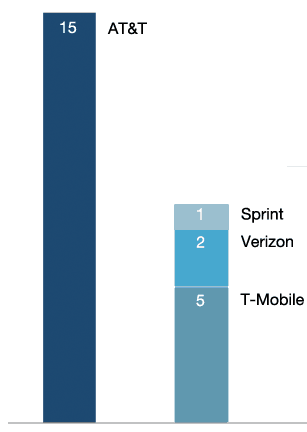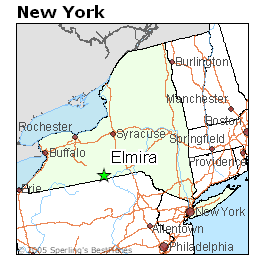Frontier Communications customers may get less than they bargained for when calling the company about a malfunctioning modem or problem with service. Andrew, a Stop the Cap! reader from Tennessee discovered a simple service call left him stuck with two separate contracts for phone and Internet service, a major broadband speed reduction, and a sense that Frontier is willing to sign up customers without fully disclosing what they are selling.
Andrew reports he originally called Frontier to discuss a possibly damaged DSL modem. Upon hearing the model number, a Frontier customer service representative needed to hear no more — the modem “needed to be upgraded.” In fact, Frontier has been mailing postcards to customers with older modems not subject to monthly rental fees telling them their existing modem was “no longer supported” and needed to be replaced with a new model. In the fine print, the customer learns if they proceed, they will end up paying a monthly modem rental fee starting at $6.99… forever.
But things got much worse for this Frontier customer after he contacted the company to say he’d be keeping his current DSL modem, which turned out to be working just fine:
I was then told there would be about a $20 price drop on my next bill (for July). I asked the agent why and her response was, “oh, our prices are going down.” I said okay, thanked her and hung up the phone.
The next morning, I got an email from Frontier thanking me for my ”recent purchase or renewal of services,” further asking me to click and view the Terms of Service agreement for High Speed Internet (and to submit the PIN number associated with my account).
I then called Customer Service about the email. I was told that I had upgraded my phone service the previous day. It turned out that the agent upgraded my phone service to include their ”Digital Essentials” phone features package and had locked me into two price protection plans for both services. There was a one-year plan regarding the phone service and a two-year plan for the High Speed Internet.
I was shocked and informed the agent that I had made no such changes to my phone/Internet services and that I had simply called about cancelling a support ticket on my account regarding the modem.
He later tried to claim that I had given the previous agent authorization when I said okay after she had informed me about the price drop. I told him that was absolutely ridiculous, especially since she never discussed any upgrades to my phone service or any changes regarding my Internet. I asked him how it could be an authorization when what was done to my account was never fully explained (or asked for).
The Frontier agent then proceeded to hard-sell Andrew the same plan the former agent already applied to his account. The Frontier representative did not bother to mention the “upgrade” and “savings” he was getting included a drastic speed reduction. Frontier sold Andrew a package that included just 1.2Mbps broadband. That is less than half the speed of his original 3Mbps service, for which he paid $40 a month with no modem rental fee.
Now Andrew is stuck with two contracts, both which carry early termination fees that will total well in excess of $100, the likelihood of a modem rental fee for a new modem he has never received and does not want, and less than half the broadband speed he used to get.
“I was never told by either agent I spoke with that my Internet speed would be [reduced] once the ‘upgrade’ was performed,” Andrew writes. “This, in my opinion, is fraud. Had I known a slower speed would be the end result of their price drop, I would have never [signed up].”
Now Andrew wants his old plan back and Frontier is stalling.
Frontier has a track record of retiring older service plans and packages, but leaving existing customers grandfathered on them until a representative can convince a customer to switch to something else. Unfortunately, newer plans often come with higher prices and more surcharges than older ones, which is part of the company’s effort to increase average revenue earned from each customer. Once off a discontinued plan, low level customer service representatives typically cannot re-enroll a customer.
But those who complain the loudest can get back the service they used to have, just by becoming a nuisance. Start by calling Frontier and asking to speak to a supervisor or manager. If that fails, ask to be transferred to the department that handles disconnections and threaten to drop all Frontier services if the company does not relent and put you back on the plan you started with.
Customers can also file complaints with their state utility regulators. In Tennessee, that is the Tenessee Regulatory Authority. Their online complaint form is here. Unfortunately, many states have succumbed to deregulation rhetoric and state regulators lack significant enforcement powers. But utilities that routinely filibuster state officials risk generating enough legislative energy to support a “re-regulation” effort, so most utilities will connect complainers to an executive level customer service department that can cut through red tape.
Customers can also file complaints with the Better Business Bureau and their state’s Attorney General. The more noise you generate, the more likely Frontier will satisfy your request.
Frontier customers are advised that anytime a customer service representative asks you to complete an online agreement using your PIN number, it signals you are about to commit yourself to a term contract or other major change in service that could prove costly to undo.
Always ask the Frontier representative to e-mail you a copy of the terms of the plan you are enrolling in, including broadband speeds, phone features, contract length and early termination fees.
Always read the agreement you are being asked to complete online.
If you have any questions, call Frontier before you sign. Some plans include a 14 or 30 day penalty-free cancellation provision. While this alone may not restore your old service, it can prove an important negotiating tool to win back the service you had before.


 Subscribe
Subscribe








